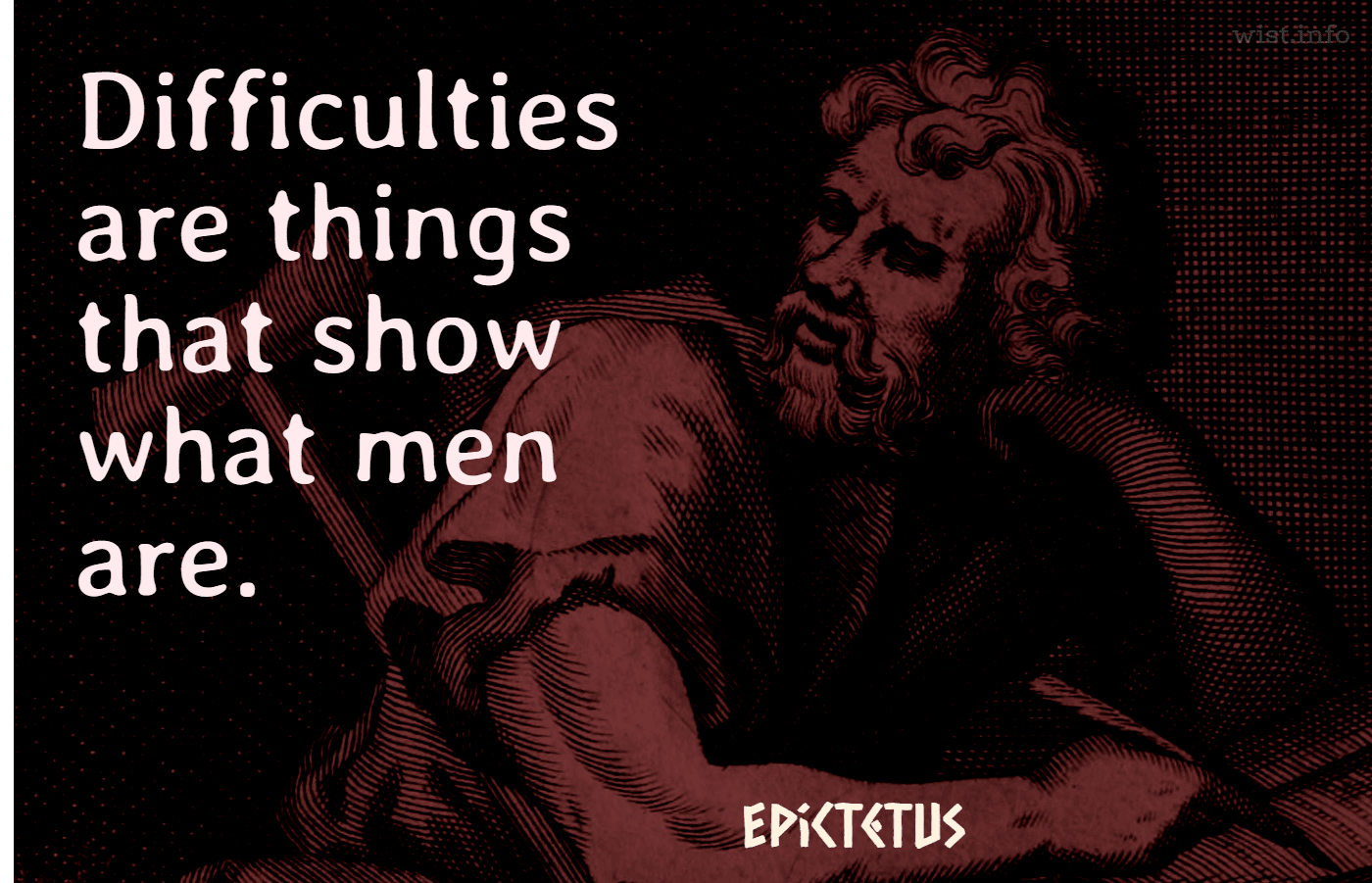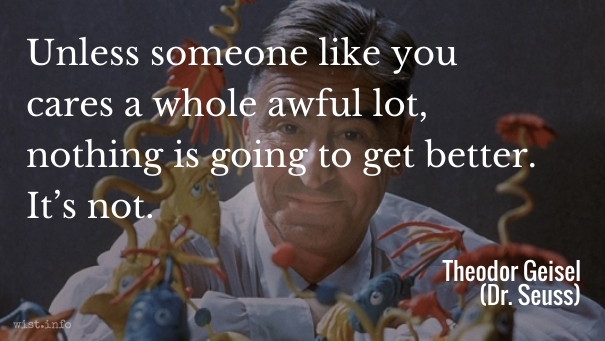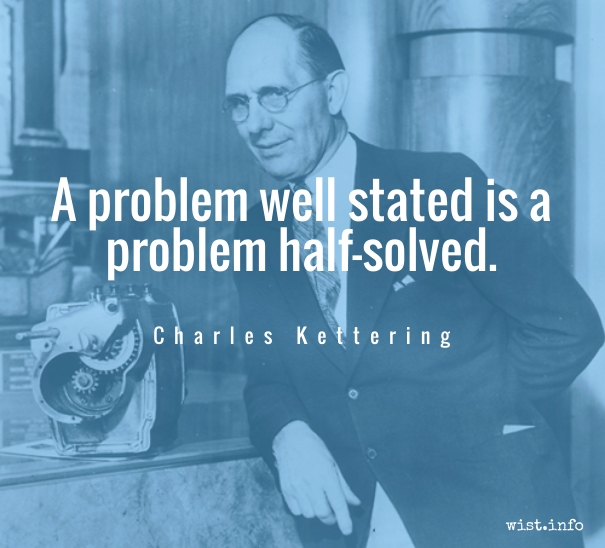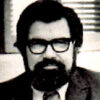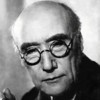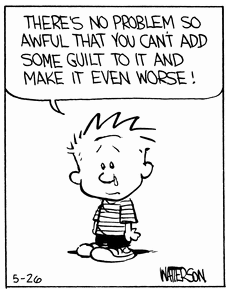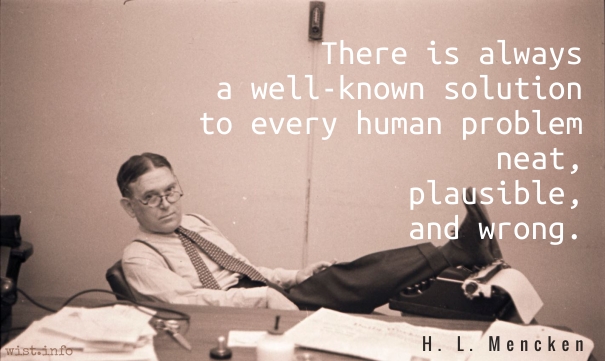The stars have not dealt me the worst they could do:
My pleasures are plenty, my troubles are two.
But oh, my two troubles they reave me of rest,
The brains in my head and the heart in my breast.A. E. Housman (1859-1936) English scholar and poet [Alfred Edward Housman]
“Additional Poems,” No. 17 (pub. 1937)
(Source)
Quotations about:
problem
Note not all quotations have been tagged, so Search may find additional quotes on this topic.
Don’t let the future disturb you. You will meet it, if you have to, with the same weapons of reason which today arm you against the present.
[Τὰ μέλλοντα μὴ ταρασσέτω· ἥξεις γὰρ ἐπ᾿ αὐτά, ἐὰν δεήσῃ, φέρων τὸν αὐτὸν λόγον, ᾧ νῦν πρὸς τὰ παρόντα χρᾷ.]
Marcus Aurelius (AD 121-180) Roman emperor (161-180), Stoic philosopher
Meditations [To Himself; Τὰ εἰς ἑαυτόν], Book 7, ch. 8 (7.8) (AD 161-180) [tr. Coker (2022)]
(Source)
(Source (Greek)). Alternate translations:Let not things future trouble thee. For if necessity so require that they come to pass, thou shalt (whensoever that is) be provided for them with the same reason, by which whatsoever is now present, is made both tolerable and acceptable unto thee.
[tr. Casaubon (1634), 7.6]Be not disturb'd about the Future; for if ever you come to it, you'll have the same Reason for your Guide, and Protection, which preserves you at present.
[tr. Collier (1701)]Be not disturbed about futurity: You shall come to encounter with future events, possessed of the same reason you now employ in your present affairs.
[tr. Hutcheson/Moor (1742)]Be not solicitous about future possibilities. You will encounter them when they approach, under the conduct of the same reason which you make use of on every present emergency.
[tr. Graves (1792)]Let not future things disturb thee, for thou wilt come to them, if it shall be necessary, having with thee the same reason which now thou usest for present things.
[tr. Long (1862)]Be not disturbed about the future, for if ever you come to it, you will have the same reason for your guide, which preserves you at the present.
[tr. Collier/Zimmern (1887)]Let not the future perturb you. You will face it, if so be, with the same reason which is yours to meet the present.
[tr. Rendall (1898)]Be not troubled about the future. You will come to it, if need be, with the same power to reason, as you use upon your present business.
[tr. Hutcheson/Chrystal (1902)]Be not disquieted about the future. If thou must come thither, thou wilt come armed with the same reason which thou appliest now to the present.
[tr. Haines (Loeb) (1916)]Let not the future trouble you; for you will come to it, if come you must, bearing with you the same reason which you are using now to meet the present.
[tr. Farquharson (1944)]Never let the future disturb you. You will meet it, if you have to, with the same weapons of reason which today arm you against the present.
[tr. Staniforth (1964)]Do not allow the future to trouble your mind; for you will come to it, if come you must, bringing with you the same reason that you now apply to the affairs of the present.
[tr. Hard (1997 ed.)]Forget the future. When and if it comes, you’ll have the same resources to draw on -- the same logos.
[tr. Hays (2003)]Do not let the future trouble you. You will come to it (if that is what you must) possessed of the same reason that you apply now to the present.
[tr. Hammond (2006)]Do not allow the future to trouble your mind; for you will come to it, if come you must, bringing with you the same reason that you now apply to the affairs of the present.
[tr. Hard (2011 ed.)]
To bear other Peoples afflictions, every one has Courage enough, and to spare.
Benjamin Franklin (1706-1790) American statesman, scientist, philosopher, aphorist
Poor Richard (1740 ed.)
(Source)
The one thing that unifies men in a given age is not their individual philosophies but the dominant problem that these philosophies are designed to solve.
Jacques Barzun (1907-2012) French-American historian, educator, polymath
Romanticism and the Modern Ego, ch. 1 (1943)
(Source)
What I have come to recognize is that just as “the black problem” turned out to be a problem of white racism, just as “the woman problem” turned out to be a problem of male sexism, so “the homosexual problem” is really the homophobia of many heterosexuals.
William Sloane Coffin, Jr. (1924-2006) American minister, social activist
The Courage to Love, ch. 5 (1982)
(Source)
There is nothing as easy as denouncing. […] It don’t take much to see that something is wrong, but it does take some eyesight to see what will put it right again.
Will Rogers (1879-1935) American humorist
Column (1935-07-28), “Weekly Article: The Lawyers Talking”
(Source)
O human beings, you’re born to fly straight up,
Why does a little gust of wind bring you down?
[O gente umana, per volar sù nata,
perché a poco vento così cadi?]Dante Alighieri (1265-1321) Italian poet
The Divine Comedy [Divina Commedia], Book 2 “Purgatorio,” Canto 12, l. 95ff (12.95-96) (1314) [tr. Bang (2019)]
(Source)
Some translators have this as a comment by Dante on how few takers there are to the Angel of Humility's invitation to ascend higher; others, including most modern translators, make it part of the Angel's speech.
(Source (Italian)). Alternate translations:Ye Souls for Heav'n design'd! ye Sons of Day!
Why should a random breeze o'erset your fail
When heav'n-ward bound?
[tr. Boyd (1802), st. 18]O ye race of men
Though born to soar, why suffer ye a wind
So slight to baffle ye?
[tr. Cary (1814)]O human race! whose birthright is to soar,
How little wind will make your course give o'er!
[tr. Bannerman (1850)]O human creatures, born to soar aloft,
Why fall ye thus before a little wind?
[tr. Longfellow (1867)]O race of men, born to fly upward, why at a little wind fall ye so down?
[tr. Butler (1885)]O human race, though born above to soar,
Why at the slightest breath dost thou thus fall ?
[tr. Minchin (1885)]O human race, born to fly upward, why before a little wind dost thou so fall?
[tr. Norton (1892)]O human folk, born to fly upward, why at a breath of wind thus fall ye down?
[tr. Okey (1901)]O race of men, born to fly upward, why do you fall back so for a little wind?
[tr. Sinclair (1939)]O human spirits, upward born to spring,
Why fall ye down at a brief blast of air?
[tr. Binyon (1943)]O human race, born to take flight and soar,
Why fall ye, for one breath of wind, to earth?
[tr. Sayers (1955)]O sons of man, born to ascend on high,
how can so slight a wind-puff make you fall?
[tr. Ciardi (1961)]O race of men, born to fly upward,
why do you fall so at a breath of wind?
[tr. Singleton (1973)]O race of men, born to fly heavenward,
how can a breath of wind make you fall back?
[tr. Musa (1981)]O human race, born to fly upwards,
Why do you fall at such a little breeze?
[tr. Sisson (1981)]O humankind, born for the upward flight,
why are you driven back by wind so slight?
[tr. Mandelbaum (1982)]O human race, born to fly upward, why do you fall at so little wind?
[tr. Durling (2003)]O human race, born to soar, why do you fall so, at a breath of wind?
[tr. Kline (2002)]O human nature! You are born to fly!
Why fail and fall at, merely, puffs of wind?
[tr. Kirkpatrick (2007)]O race of man, born to fly on high,
why does a puff of wind cause you to fall?
[tr. Hollander/Hollander (2007)]O human race, born to fly on high,
How can the slightest breeze blow dust in your eyes?
[tr. Raffel (2010)]
Nobody knows the trouble we’ve seen — but we keep trying to tell them.
Mignon McLaughlin (1913-1983) American journalist and author
The Second Neurotic’s Notebook, ch. 4 (1966)
(Source)
No problem of any consequence can be tackled head on.
Mignon McLaughlin (1913-1983) American journalist and author
The Neurotic’s Notebook, ch. 9 (1963)
(Source)
A resolution to avoid an evil is seldom framed till the evil is so far advanced as to make avoidance impossible.
A good laugh overcomes more difficulties and dissipates more dark clouds than any other one thing.
Laura Ingalls Wilder (1867-1957) American writer
“‘Thoughts are Things,'” Missouri Ruralist (5 Nov 1917)
(Source)
Reprinted in Stephen Hines, ed., Laura Ingalls Wilder - Farm Journalist (2007).
At least there are more forms of escapism than those who bandy that word about are always aware of. An artist, for instance, may escape from the problems of his art — which are hard to solve — into a consideration of the problems of society which he sometimes seems to think require of him only that he complain about them. Even the ordinary citizen is not always guiltless of similar techniques and it is, for example, sometimes easier to head an institute for the study of child guidance than it is to turn one brat into a decent human being.
Artists and scientists realize that no solution is ever final, but that each new creative step points the way to the next artistic or scientific problem. In contrast, those who embrace religious revelations and delusional systems tend to see them as unshakeable and permanent.
Anthony Storr (1920-2001) English psychiatrist and author
Feet of Clay: Saints, Sinners and Madmen, Introduction (1996)
(Source)
To solve an interesting problem, start by finding a problem that is interesting to you.
Eric S. Raymond (b. 1957) American software developer, writer [a.k.a. ESR]
The Cathedral and the Bazaar, ch. 2, Rule 18 (1999)
(Source)
The certainties of one age are the problems of the next.
R. H. Tawney (1880-1962) English writer, economist, historian, social critic [Richard Henry Tawney]
Religion and the Rise of Capitalism, ch. 5 (1926)
(Source)
Life is not a problem to be solved, but a reality to be experienced.
Søren Kierkegaard (1813-1855) Danish philosopher, theologian
(Misattributed)
Misattributed to Kierkegaard by Cyril Connolly, Horizon, vol. 11 (1945). More properly attributed to Jacobus Johannes van der Leeuw (1893–1934), The Conquest of Illusion, ch. 1: "The mystery of life in not a problem to be solved, it is a reality to be experienced."
This problem, when solved, will be simple.
Charles F. Kettering (1876-1958) American inventor, engineer, researcher, businessman
Sign at the General Motors research laboratories
(Source)
Quoted by Kettering in "Don't Be Afraid to Stumble," The Rotarian (Jan 1952)
There are few situations in life that cannot be honourably settled, and without loss of time, either by suicide, a bag of gold, or by thrusting a despised antagonist over the edge of a precipice upon a dark night.
The older I get, the more wisdom I find in the ancient rule of taking first things first — a process which often reduces the most complex human problems to manageable proportions.
The only problems that have simple solutions are simple problems. The only managers that have simple problems have simple minds. Problems that arise in organisations are almost always the product of interactions of parts, never the action of a single part. Complex problems do not have simple solutions.
When a mess, which is a system of problems, is taken apart, it loses its essential properties and so does each of its parts. The behavior of a mess depends more on how the treatment of its parts interact than how they act independently of each other. A partial solution to a whole system of problems is better than whole solutions of each of its parts taken separately.
Managers are not confronted with problems that are independent of each other, but with dynamic situations that consist of complex systems of changing problems that interact with each other. I call such situations messes. Problems are extracted from messes by analysis. Managers do not solve problems, they manage messes.
In reactive problem solving we walk into the future facing the past — we move away from, rather than toward, something. This often results in unforeseen consequences that are more distasteful than the deficiencies removed.
A problem never exists in isolation; it is surrounded by other problems in space and time. The more of the context of a problem that a scientist can comprehend, the greater are his chances of finding a truly adequate solution.
Successful problem solving requires finding the right solution to the right problem. We fail more often because we solve the wrong problem than because we get the wrong solution to the right problem.
Be sure of the fact before you lose time in searching for a cause.
James Burgh (1714-1775) British politician and writer
The Dignity of Human Nature, Book 1, sec. 5 “Miscellaneous Thoughts on Prudence in Conversation” (1754)
(Source)
Sometimes misattributed to Horace Mann.
CLAUDIUS: When sorrows come, they come not single spies,
But in battalions.William Shakespeare (1564-1616) English dramatist and poet
Hamlet, Act 4, sc. 5, l. 84ff (4.5.84-85) (c. 1600)
(Source)
In political institutions, almost everything we call an abuse was once a remedy.
[Presque tout ce que nous appelons un abus fut un remède dans les institutions politiques.]
Joseph Joubert (1754-1824) French moralist, philosopher, essayist, poet
Pensées [Thoughts], ch. 18 “Du Siècle [On the Age],” ¶ 21 (1850 ed.) [tr. Auster (1983), 1813 entry]
(Source)
(Source (French)). Alternate translation:In political institutions nearly everything that we now call an abuse, was once a remedy.
[tr. Lyttelton (1899), ch. 17, ¶ 8]
If ever you find yourself environed with difficulties and perplexing circumstances out of which you are at a loss how to extricate yourself, do what is right, and be assured that that will extricate you the best out of the worst situations. Though you cannot see when you take one step what will be the next, yet follow truth, justice and plain dealing, and never fear their leading you out of the labyrinth in the easiest manner possible. The knot which you thought a Gordian one will untie itself before you. Nothing is so mistaken as the supposition that a person is to extricate himself from a difficulty by intrigue, by chicanery, by dissimulation, by trimming, by an untruth, by an injustice. This increases the difficulties tenfold; and those who pursue these methods get themselves so involved at length that they can turn no way but their infamy becomes more exposed.
Thomas Jefferson (1743-1826) American political philosopher, polymath, statesman, US President (1801-09)
Letter (1785-08-19) to Peter Carr
(Source)
If anything can go wrong, it will.
(Other Authors and Sources)
“Murphy’s Law” (1949)
Direct variants:The history behind Murphy's Law -- and its very similar antecedents -- is long and disputed, unsurprising given its simple sentiments. It is most often attributed (via the name) to Capt. Edward Murphy, a development engineer working on rapid deceleration G-force tests, and first named as such by Dr. John Stapp, a US Air Force colonel and Flight Surgeon overseeing the project.
- "Anything that can go wrong, will go wrong."
- "Everything that can possibly go wrong will go wrong."
More information:See also Orwell.
- Murphy's law - Wikipedia
- The Real-Life Murphy and How 'Murphy's Law' Came to Be | Military.com
- The Evolutionary Psychology of Murphy's Law | Psychology Today
- Murphy's law - Wikiquote
If a problem has no solution, it may not be a problem, but a fact, not to be solved, but to be coped with over time.
Shimon Peres (1923-2016) Polish-Israeli politician, statesman
(Attributed)
Widely attributed to Peres in different sources. Quoted in the Wall Street Journal (7 Feb 2001). Donald Rumsfeld says that Peres made the observation to him.
It is not always by plugging away at a difficulty and sticking at it that one overcomes it; but, rather, often by working on the one next to it. Certain people and certain things require to be approached on an angle.
Evils in the journey of life are like the hills which alarm travelers on their road. Both appear great at a distance, but when we approach them we find they are far less insurmountable than we had conceived.
Charles Caleb "C. C." Colton (1780-1832) English cleric, writer, aphorist
Lacon: Or, Many Things in Few Words, Vol. 2, § 241 (1822)
(Source)
After all my time here, I’ve yet to see any problem, however complicated, which, when you looked at it in the right way, didn’t become still more complicated.
Poul Anderson (1926-2001) American writer
Call Me Joe [Arne Viken] (1957)
Sometimes attributed to Arthur Koestler (who attributed the quote to Anderson). See here for more details (and a reference to WIST).
I have found that the greatest help in meeting any problem with decency and self-respect and whatever courage is demanded, is to know where you yourself stand. That is, to have in words what you believe and are acting from.
William Faulkner (1897-1962) American novelist
Letter to David Kirk, Oxford, Miss. (8 Mar 1956)
(Source)
CALVIN: There’s no problem so awful that you can’t add some guilt to it and make it even worse!
Explanations exist; they have existed for all time; there is always a well-known solution to every human problem — neat, plausible, and wrong.
H. L. Mencken (1880-1956) American writer and journalist [Henry Lewis Mencken]
“The Divine Afflatus,” New York Evening Mail (16 Nov 1917)
(Source)
Reprinted in Prejudices: Second Series (1920) and A Mencken Chrestomathy, ch. 25 (1949).
Variants:
- "There is always an easy solution to every human problem -- neat, plausible, and wrong."
- "For every complex problem, there is a solution that is simple, neat, and wrong."
A rain came along last night and gently wet San Diego. It cleaned off my car except for a stubborn bird blessing on the hood. I had been staring at it for several days and the rain cleaned everything except that single spot. (sigh) For the most part, things take care of themselves if we just let them, but every now and again we’ve got to get involved, and dirty our hands.
















